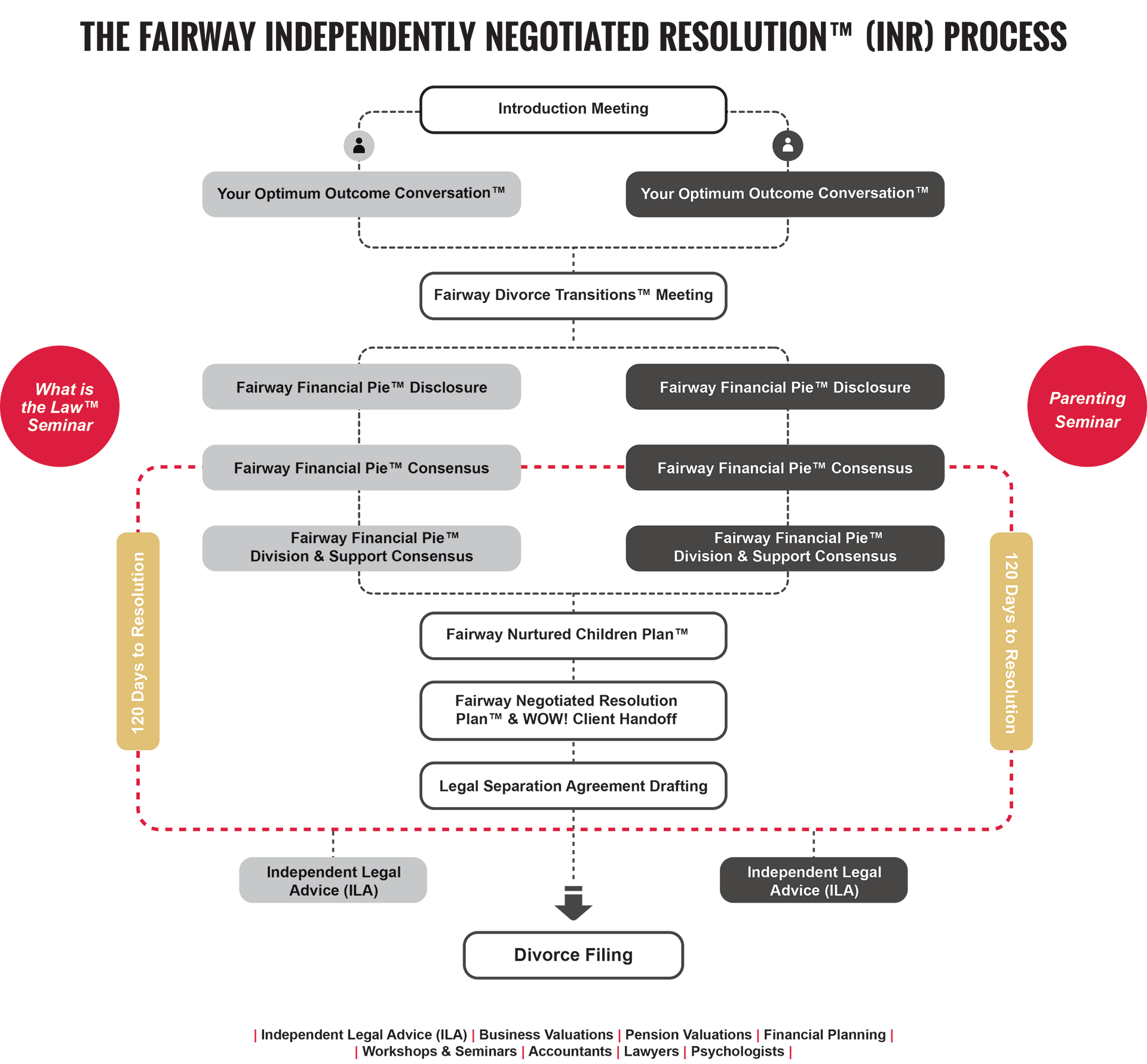Determining your child support & extraordinary expenses
At Fairway Divorce Solutions, we have helped over 7,300 couples negotiate child support and extraordinary expenses with a well-thought-out plan that has set them and their children up for success and happiness.
Child support is the money that one parent pays to another to support their children financially after a separation or divorce. It is a monthly payment for the benefit of dependent children. Since it is considered the "right" of the child, any deviation from the guidelines is seldom warranted. If there is a dispute, it is usually in the determination of income.
 At Fairway Divorce, our financial divorce resolution experts apply The Fairway Method™ to take you both step by step through all financial decisions, including Child Support. Child support payments are based on several factors, including where the children will reside as well as the income of each parent. While the Federal Child Support and Spousal Support Guidelines set out what to pay, there is debate around its fairness. The guidelines must be followed.
At Fairway Divorce, our financial divorce resolution experts apply The Fairway Method™ to take you both step by step through all financial decisions, including Child Support. Child support payments are based on several factors, including where the children will reside as well as the income of each parent. While the Federal Child Support and Spousal Support Guidelines set out what to pay, there is debate around its fairness. The guidelines must be followed.
Calculating child support is only sometimes straightforward. Some of the complications are around the determination of income. For example, if income includes bonuses, dividends, capital gains or losses, investment or interest income, these must be addressed individually and in detail. Fairway's financial divorce resolution experts are experienced with these complexities. Your Fairway financial mediator will ensure that income calculations adhere to the law but also make sense in the real world – your world.
Child support is calculated in several ways. If both parties make precisely the same and share parenting almost 50/50, then there will be no exchange of child support. However, if the parties do not make the same, then even in a 50/50 arrangement, the higher-paid parent will pay the lower income earner to help even out the houses for the benefit of the children.
Extraordinary Expenses, also known as "Section 7's", are expenses above and beyond base child support. The term “extraordinary” will apply depending on the parties' activity and joint income. For some families, an activity might be considered a section 7; for others, it would fall under child support. The expenses usually need to be agreed upon so neither parent is caught off guard and can plan around personal finances. The parents then share the cost pro rata based on each person's income. The calculation is your income divided by the total of both incomes, which equals the percentage of the expense you will be responsible for.
The key to successful negotiations is to ensure a positive co-parenting relationship and avoid damaging or resentful feelings around money. At Fairway, we believe kids come first, and therefore, we do everything in our power to set you up for a positive co-parenting relationship. We know this will foster self-confidence and happiness in children.
The average cost of a separation/divorce in Canada is now over $51,000
Client testimonials
Success comes in many forms. For us, it is hearing back from our clients and reading how we have changed their lives for the better. These stories are the reason we do what we do.

I would like to thank Fairway Divorce Solutions for the assistance required for final closure on our divorce. You have been instrumental in aiding to ensure common sense, law and the best interests of our children were at the forefront of our negotiations. This could not have been easy for the Senior Negotiators due to the emotions involved at times. You have helped make a difficult decision that much easier on all family members involved.
- Fairway Client, June 2018
The Unique Fairway Method
Divorce is difficult. We make is easier from start to finish. The Clear Road to a New Life®

Fairway Divorce Solutions meets your needs
Locations
Helping Canadians with divorce mediation since 2006, with more than 25 Divorce Resolution Mediators in more than 11 locations.
Head Office
Head Office
Manitoba
WinnipegAlberta
Airdrie Calgary Edmonton East Edmonton Southwest Edmonton Northwest Fort McMurray Fort Saskatchewan Grande Prairie Leduc Lethbridge Medicine Hat Okotoks Red Deer Sherwood ParkOntario
Waterloo WellingtonSaskatchewan
SaskatoonFrequently asked questions
“Child support” is the money that one parent pays to another to support their children financially after a separation or divorce.
It is a monthly payment for the benefit of dependent children. Since it is considered the “right” of the child, any deviation from the guidelines is seldom warranted. If there is a dispute, it is usually in the determination of income.
The Federal child support and spousal support guidelines set out what is required to be paid. Some guidelines fall under federal law, while others are under provincial or territorial law.
The amount of child support paid depends on:
- the number of children
- where the children are residing and for how much of the time
- Line 150 of your income tax return
Typically, when it comes to child support, there is little to no room to negotiate.
Where negotiations and debate often happen is in determining the incomes that are used to drive payments. If income is reasonably straight-forward as in an employee T4, then determining the child support amount is quite easy.
If, however, income varies due to commissions, investment returns, employee stock option, self-employment or smaller business incomes, then determining the number to use to calculate child support can be complicated. In this way, it is important to ensure you are using a number that makes sense given the specifics. It used to be that using previous years’ income to determine next years was the go-to method, however with the changing economy across Canada, there is less stability and therefore many are choosing to use present incomes.
Our child support software and reference tables determine payments based on if you are sharing the parenting responsibilities or if one party has the children more than the other. In cases where parents are sharing their time equally, then both parties’ incomes are used to calculate the support payments. Basically how it works is that the higher payor deducts what the lower-earning parent has to pay and then covers the difference.
NO – so do not waste time arguing this point.
Extraordinary expenses are sometimes referred to as section 7 expenses. Special or extraordinary expenses are above and beyond child support. These expenses are shared, based on a pro rata calculation between the party’s income. For example, if one spouse earns $200,000 and the other spouse earns $100,000, then expenses are split 2:1. These expenses are typically agreed to in advance before incurred. Couples will come up with a process for reconciling the payments after they have been incurred. Some couples reconcile monthly, and other couples reconcile quarterly. Couples can either set out the extraordinary expenses for the coming year or set out the extraordinary expenses for several coming years. They can also set out how they plan on sharing the expenses based on their yearly income. There is an ability to mediate some variation in a pro rata sharing.
If the court ever must intervene, there will be a determination with regards to the necessity of the expense based on both experience and abilities to pay.
The best scenario is to work together to come up with a plan that includes activities, lessons, camps, school, childcare, and any other expense that does not fall under basic child-support.
It is essential to understand that the definition of extraordinary expense is based on what is extraordinary considering the parties joint income. In other words, what may be considered extraordinary for one family may not be extraordinary for another. In the case of a private school for example, for a wealthy family, it may be not be considered an extraordinary expense whereas a less wealthy family it would likely be considered extraordinary. So this will either be shared pro rata or decided it is no longer affordable, and that public school is the best option.
Fairway is committed to gets results for positive child support outcomes. Our team of experts works with the parties to ensure accurate income numbers for purposes of calculating child support and appropriate sharing and decision making around extraordinary expenses. At Fairway across Canada we:
- take into consideration everyone’s needs
- base payments on the Child Support Guidelines – determine income numbers - - - - such that the payments are fair but designed to align with parents receiving their - income (e.g., PSUs, RSU’s Bonus, commission’s)
- work with both parties to determine what they can afford given that two households are more expensive to run than one
- set children up for a future of success both in relationships and in careers
- want children to enjoy their sports and other activities without feeling deprived due to divorce
- ensure children see parents putting children first
- ensure children come first but not at the expense of the wellbeing of their parents
- Using children as pawns
- Getting distracted by parenting conflict rather than focusing on figuring out the incomes so that the simple calculation can be made
- Using percentages of parenting time to control child support payments (that was never the case before the guidelines were created in Canada)
- Not putting the children first
- Threats to remove children from past activities or schools
- Impacting major and often unnecessary changes to children’s lives
- Ignoring economic downturns in the country









